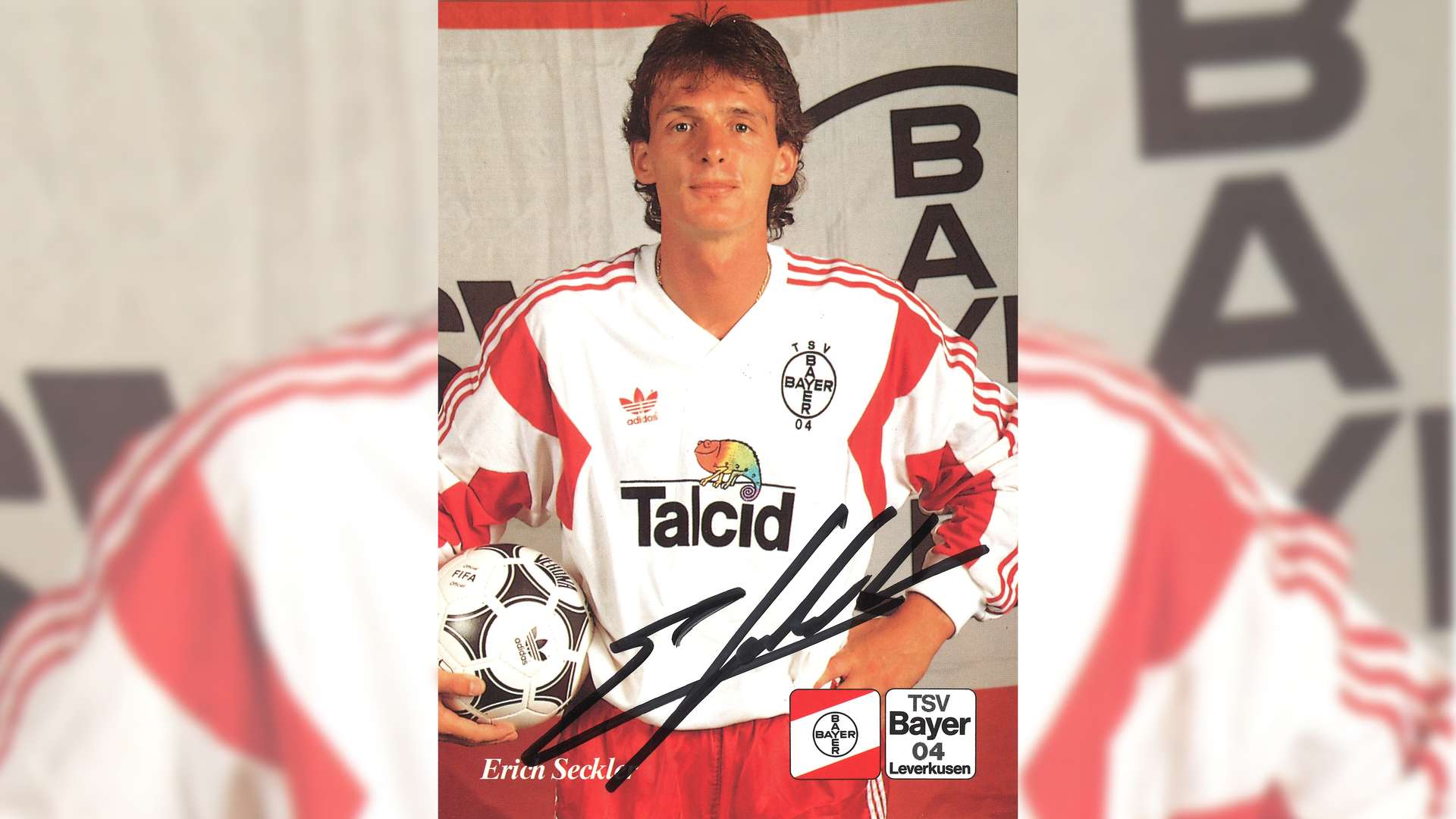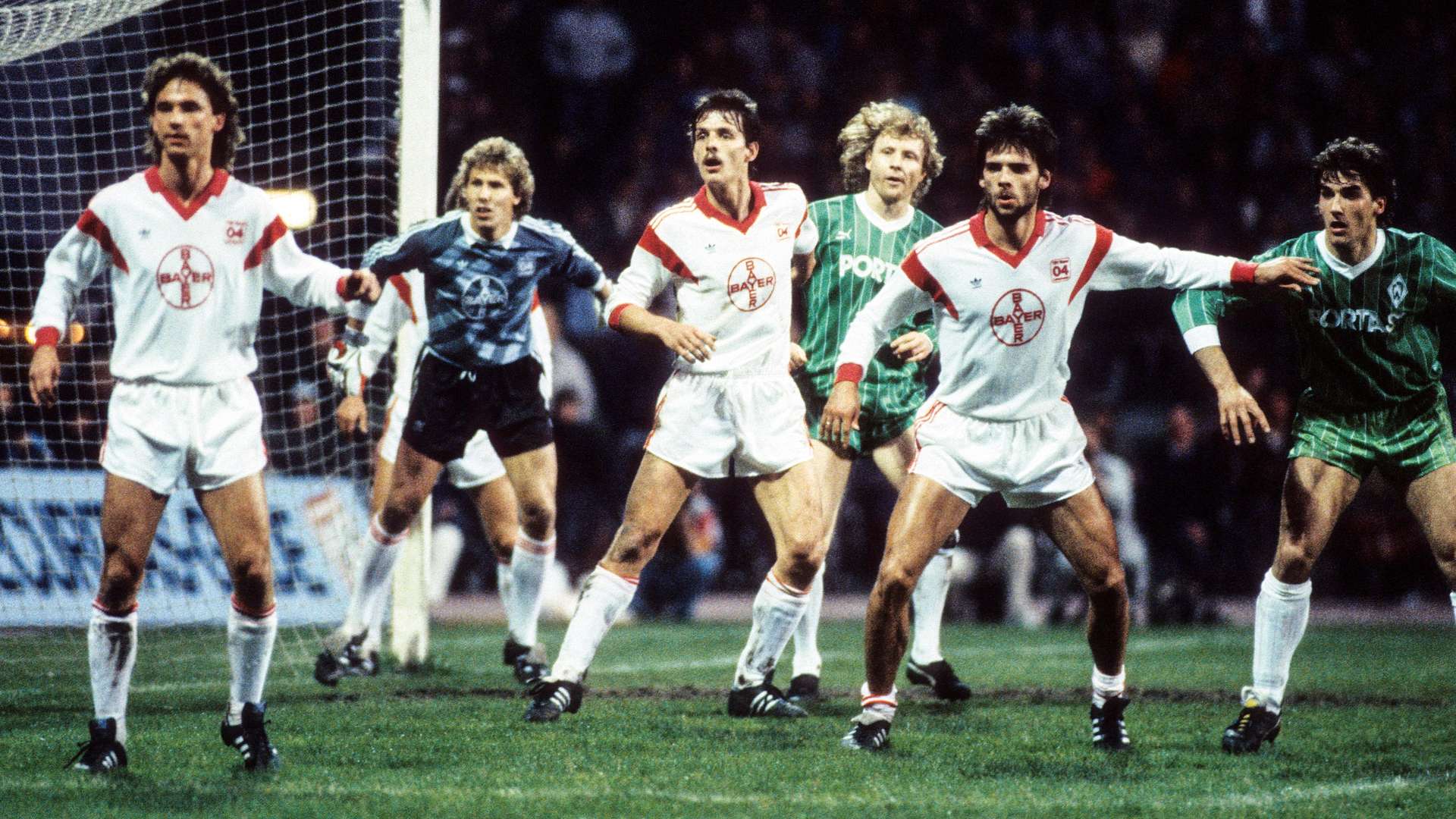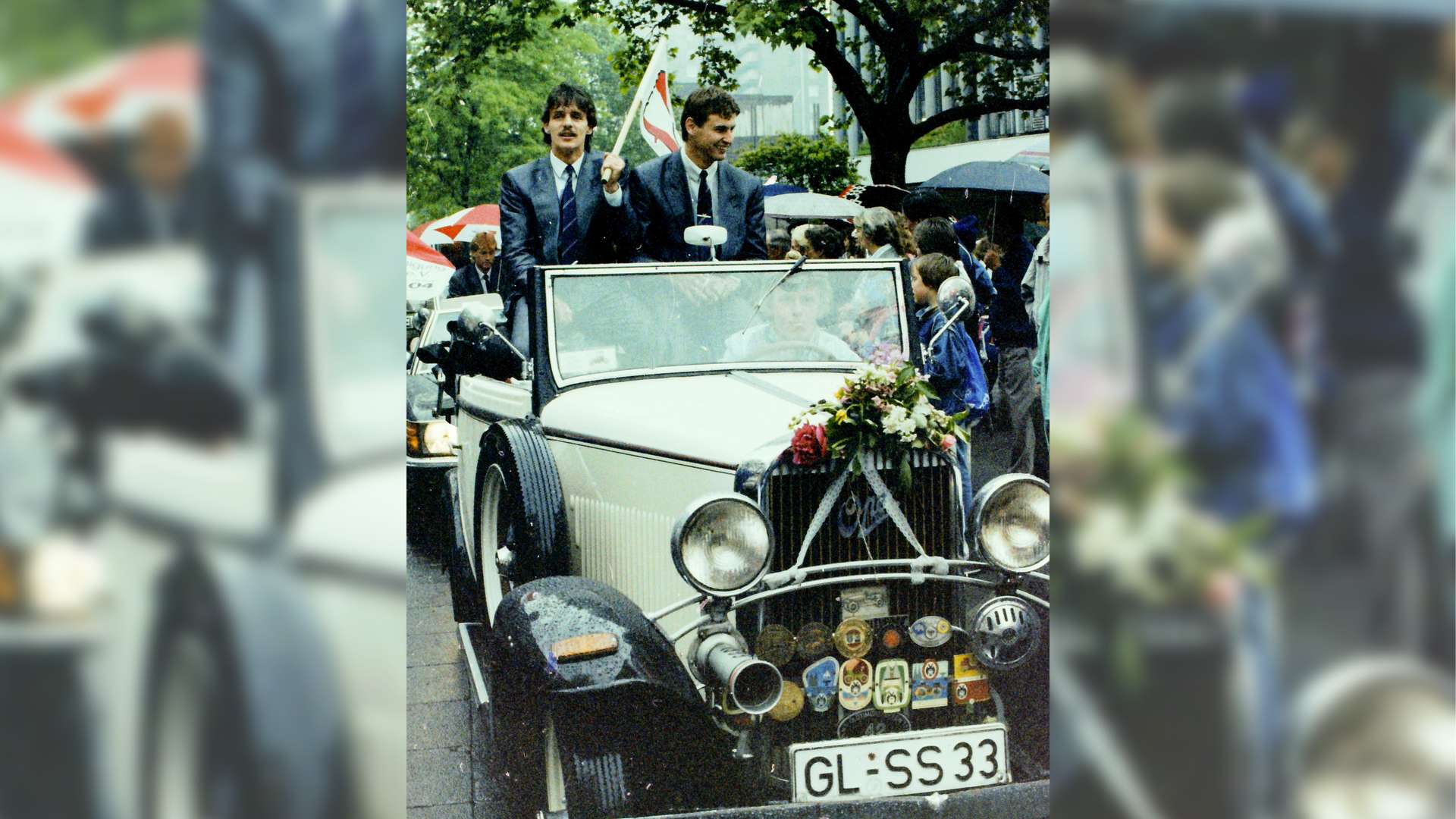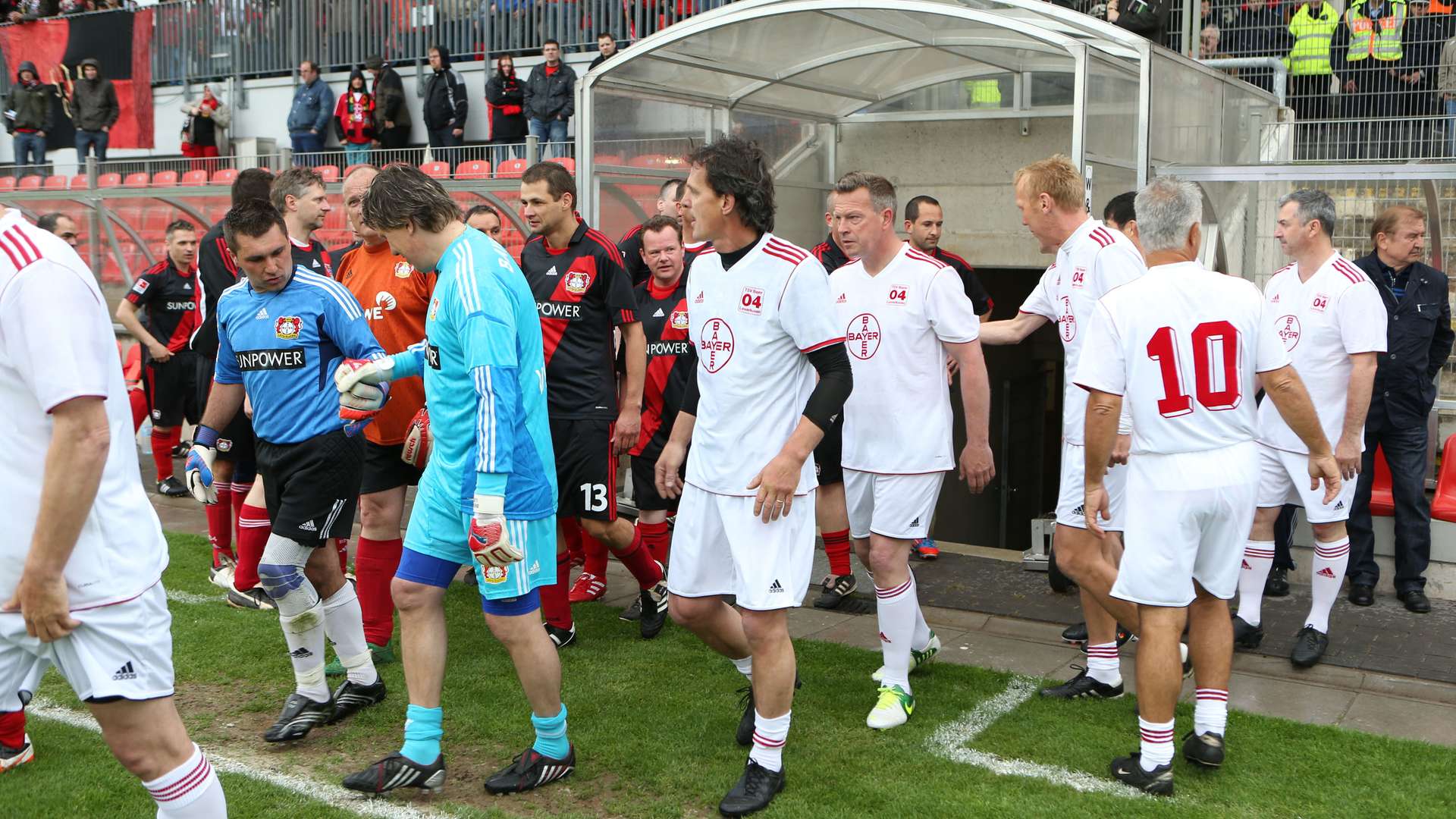"I was never a typical football player"
Interview with Erich Seckler

It's not easy to get hold of him on the phone. On the one hand, Erich Seckler was never one for public appearances and, on the other hand, the 59-year-old is very busy at work. The 1988 UEFA Cup winner even had to keep disappearing during our interview to lend a hand here or solve a technical problem there. Children often come into his office asking for a ball. Erich Seckler, who played for Bayer 04 between 1980 and 1992, today works as a caretaker at a primary school in Düsseldorf. In an interview with bayer04.de, the former central defender talks about his love for the job he does, how he became a professional footballer back then, his memories of the 2-2 draw against Feyenoord 35 years ago today and why he tried stage diving after the second leg of the final against Espanyol.
Erich, you appear to be in great demand. Everybody is after you all the time.
Seckler: (He laughs) Yes, you never get a minutes peace here, you're always on the go. But that's exactly how I like it. I've been the caretaker at the Rolandschule, a community primary school in Düsseldorf-Golzheim, for six years. And I love the job. The contact with the teachers, teaching assistants and, above all, the children is simply brilliant. We have 420 schoolchildren here. Of course, you're constantly on your feet as a caretaker at such a relatively big school and you're a jack of all trades. I’ve just been with the technician for two hours setting up the wireless printer so all the children and the teachers can print out information from their tablets in the classroom. We are a relatively modern and well-equipped school.
Your job also demands skilled work with your hands. Have you had the relevant training?
Seckler: Yes, I completed a course as a steel construction fitter at Mannesmann-Demag. But I soon realised it wasn't really the thing for me. When I played for Bayer 04 I worked for Bayer AG as well. It was relatively flexible there in terms of training. I did a number of jobs after my time as a football player.
Such as?
Seckler: I worked in youth welfare amongst other things. And before I became a caretaker I worked for several years as an employee at a nursery and farm in Monheim. That was also great fun. At the end of the day, my training as a steel construction fitter did help me very much although I didn't like it much at the time. Without completing vocational training I would never have been able to get this job as a caretaker working for Düsseldorf council.
Were you still involved with football after the end of your playing career?
Seckler: Yes, I got my coaching badge alongside my former Werkself teammate Andrzej Buncol. Then I coached a number of clubs in the region: my home club Baumberg, as well as Monheim and Berghausen. Just district and state leagues but that was good enough for me. I also took advantage of my time off after years as a player. As a footballer, you’re always on the road every weekend. Even on holiday the coaching staff used to say how you had to keep fit, what you had to eat and how much you could weigh. I didn't find it difficult giving up being a professional player. I was never a typical football player who dreams of becoming a professional. I just stumbled into it unexpectedly.

Can you tell us how you became a professional footballer?
Seckler: I grew up in Baumberg and played for the U19s at Sportfreunde Baumberg. Then I actually wanted to stop playing football because the senior side was not up to it. At some point, Andreas Franke of Bayer 04 asked me if I'd like to have a trial at Leverkusen. And suddenly I was at Bayer 04 playing for the Reserves. Then it all happened pretty quickly. I was soon called up to the Middle Rhine team, a week later in the Western Germany side and shortly after that I was suddenly in the Germany U18 squad. It was crazy. Before I only played football for fun. Now I was being paid for it – and nevertheless, or perhaps because of that, I lost a bit of desire to play. It was just completely different. In my first international in France I was so badly injured that it was the end of the story. I was happy to be able to walk again after tearing ligaments in my knee. I then went on to play for the Bayer 04 second team for seven years.
Always as a centre back?
Seckler: Yes, I always up against the man. Back then it was rightly called man-to-man marking. When I see how strikers score goals today: that would have never happened back in the day. They wouldn't have been on the pitch for ten minutes before going off injured (he laughs). Nobody marks properly these days. I don't understand how people don't challenge before getting to the box at least.
Who brought you through to the senior squad?
Seckler: My coach Gerd Kentschke, who was also assistant coach of the first team, recommended me to Erich Ribbeck. I got a call to go training because as there are a lot of injuries in the first-team squad. And what happened at my first training session? I ran onto the pitch, got my studs caught in the turf and I broke my foot. Just like that without anybody else been involved. That was at the beginning of 1987 and then I was sidelined for a couple of months. What a start with the first team.
But you made your comeback. You played your first Bundesliga match against Bayer 05 Uerdingen on 17 October 1987 when you were 24 years old.
Seckler: Yes, I played against Stefan Kuntz and did a good job. He didn't score and the match ended 0-0.
Your next debut came four days later: your first UEFA Cup match against FC Toulouse – how was your European premiere?
Seckler: I was excited before the match, that's clear. But then the ref blew and you suddenly have other worries. After a couple of minutes on the pitch I thought: Crikey how strong my opponent is!
He also had a big reputation: Dominique Rocheteau, a player with the Equipe Tricolore and a European champion with France in 1984.
Seckler: Exactly, I wouldn't have remembered the name. My biggest worry was: If I look bad against him then my teammates, the club and the fans would be annoyed with me afterwards. I definitely wanted to avoid that. And it worked out really well, Rocheteau though didn't score either – just like Kuntz.
After two successful debuts against Uerdingen and Toulouse, did you think I've finally made the breakthrough?
Seckler: No, not at all. In all my years with the reserves, I never aimed for the first team. It really didn't bother me. And then I also thought: Good, you will play for a bit and then go back to your team. I didn't feel part of it all at the start. It all started with me always driving second-hand cars that only cost a couple of hundred Deutschmarks. Christian Schreier had a go at me in the dressing room: "You'll be in trouble if you park your banger next to my car again." He was driving a big BMW – but it didn't bother me at all (he laughs).
35 years ago today there was a hard-fought UEFA Cup match in Rotterdam. What are your memories of the 2-2 draw in the Round of 16 game between Bayer 04 and Feyenoord on 25 November 1987?
Seckler: What I do remember: It was pretty cold in Rotterdam and I think we were 2-0 up. In the end, in spite of giving away the lead, the 2-2 draw was a good starting point for us. But that's all I can remember about it.

You made a total of eight appearances in the UEFA Cup in 1987/88 – which was your toughest game?
Seckler: In addition to the dramatic final in Leverkusen, I'll never forget the semi-final second leg in Bremen. It felt like we defended for 180 minutes. We'd won the first leg 1-0. Werder put us under incredible pressure in front of their own fans with balls just flying past our ears and I thought we’d concede a goal. Manni Burgsmüller often crossed my path or more accurately I frequently crossed his. We held on to the 0-0 scoreline and were in the final. Madness!
You were in the stands for the first leg of the final in Barcelona.
Seckler: Yes, I was suspended. I sat next to Christian Schreier who said to me after the third goal scored by the Spaniards: "That's it. It's all over." I looked at him and then the pitch and thought: No, that can't be all. I still felt we had a chance in the second leg. When it was 0-0 at half-time in Leverkusen, a couple of friends of mine who were at the Haberland Stadium decided to drive home. And, of course, they were really annoyed afterwards. It was a crazy game. I said in the dressing room beforehand: If we win this cup then I'll jump from the fence into the fans like stage diving. And that's exactly what I did. A couple of minutes after a Spaniard missed the last penalty I ran to the home end, climbed the fence and fell into the crowd. I quickly regretted it as the fans did catch me but I had to go the long way round to get back on the pitch.
You ended your time at Leverkusen after twelve years under the Bayer Cross in 1992. How did the move to Hertha Berlin come about?
Seckler: My Leverkusen teammate Marcus Feinbier, who came from Berlin, made contact for me. In Berlin I had big problems with my back relatively quickly and had to take lots of pills and ended my playing career at the age of 30. My wife and I then moved straight back to Baumberg.

Are you still in contact with former teammates?
Seckler: No, not at all. I hardly watch football now. But I think it was great that we celebrated the 30th anniversary of our UEFA Cup win in Leverkusen in 2018. We came together again after such a long time and it was just as if we parted company three days before that. The same people were at the table, making the same quips and gladly having an extra drink – it was a wonderful evening. And then we all went home and didn't hear anything from each other again. That's the way it is. I'm not the type to take the first step. I did play for the Bayer Veterans again a couple of years ago. And recently I was a spectator at the BayArena in the 3-0 defeat against Porto in the Champions League. That wasn't so great. But now the team is back on track.
